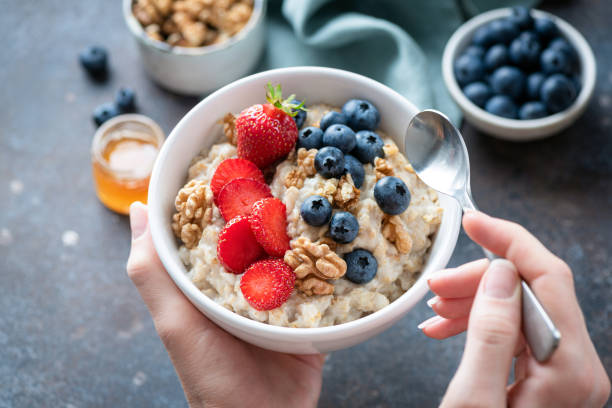There’s no formal definition of superfood, but they’re generally foods that pack a big punch of nutrients into every bite. That said, registered dietitians say a balanced diet shouldn’t depend on one nutrient-dense food to be healthy.
The best diets consist of whole, unprocessed foods such as vegetables, fruits, whole grains, low-fat dairy and lean meats.
1. Green Tea
Green tea leaves (Camellia sinesis) contain a high amount of antioxidant compounds called polyphenols. Many epidemiological studies suggest that regular green tea consumption decreases the development of chronic diseases like cancer and heart disease.
Whether or not green tea packs its full health potential depends on how it’s prepared, Casper notes. For example, cold tea may not have as many antioxidants as hot tea.
2. Chia Seeds
These tiny seeds are hygroscopic, absorbing up to 10 times their weight in water and developing a gel texture. They’re also a good source of protein and omega fatty acids.
They’re the edible seeds of the Salvia hispanica plant, native to Mexico and Guatemala. They’ve been a staple food for the ancient Aztec and Mayan people. Chia seeds pack a hefty nutritional punch, including protein, fiber, omega fatty acids, minerals and antioxidants.
3. Quinoa
Quinoa (pronounced keen-wah) is an ancient food and superfood known for its impressive nutrient profile. This protein-rich food is also gluten-free and can be easily incorporated into a variety of recipes.
Quinoa is unique because it is a complete source of protein, providing all nine essential amino acids. It is also a good source of iron, magnesium, potassium, and calcium. This versatile ingredient is a must-try for anyone looking to live a healthy lifestyle.
4. Avocado
Avocados are low in sugar and contain a significant amount of soluble and insoluble fiber, which supports appetite regulation and gut health. They are also an excellent source of heart-healthy fats, potassium, vitamin E and B vitamins.
One avocado contains a nutrient and phytochemical profile similar to 1.5 ounces of tree nuts with qualified heart-health claims, but without half the calories (USDA, 2011).1
5. Broccoli
Broccoli, along with other cruciferous vegetables, is a superfood that contains a large amount of cancer-fighting compounds. It also provides vitamin K, calcium and iron.
Its anti-inflammatory and antioxidant properties help reduce the risk of heart disease, by preventing plaque buildup in blood vessels. The glucosinolates and isothiocyanates in broccoli may also reduce the likelihood of developing cancer. It also contains sulfur-containing compounds, which can prevent tooth decay and bad breath.
6. Spinach
The idea of food as medicine is a long-held belief that spans across many cultures. But superfoods take this concept a step further by suggesting they can help prevent or treat diseases.
While it’s true that some foods live up to the hype – like kale and goji berries – Rohini says most of these foods aren’t any better for you than other healthy options.
7. Blueberries
Blueberries are often ranked as a superfood because of their high concentration of antioxidants. These anti-inflammatory berries help lower blood pressure and may even prevent macular degeneration.
However, it’s important to keep in mind that while some foods do have special properties, a healthful diet is based on an assortment of healthy choices. Consult a registered dietitian for more information and personalized dietary recommendations.
8. Tomatoes
Whether in the sauce on your pasta or as a topping on your burger, tomatoes are a staple in most healthy diets. These fruits and vegetables contain lycopene, potassium, vitamin C and folate.
While some superfoods have remained on the market for longer than others, a healthy diet should include a variety of foods. Ultimately, any whole food will offer health benefits.
9. Broccoli Flowers
Every year, a new superfood seems to be taking the spotlight. However, most of these foods are fads and should be avoided for the sake of your health.
Instead, focus on making progressive changes to your diet like drinking green tea and eating goji berries, kale, blueberries, quinoa, beans, turmeric and avocados. The aqueous extraction technique and testing of the seed extracts on gastrointestinal cells suggest that these’superfoods’ may have beneficial properties.
10. Kale
Dietitians aren’t necessarily anti-superfoods, but they caution that diets should be balanced and not focused on one or two foods. “Nutrition is a complex science and eating well will look different for everyone,” says Dietitian Nichola Ludlam-Raine.
Superfoods are nutrient-dense foods with proven health benefits that are typically low in calories. The green, leafy kale falls into this category. It is a nutritional powerhouse and a good source of antioxidants, glucosinolates, and lutein.
